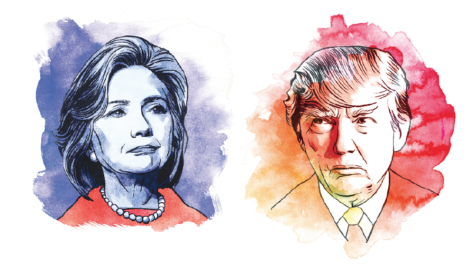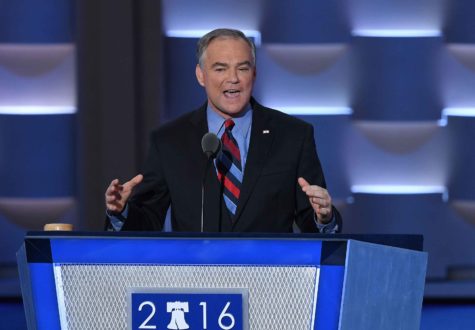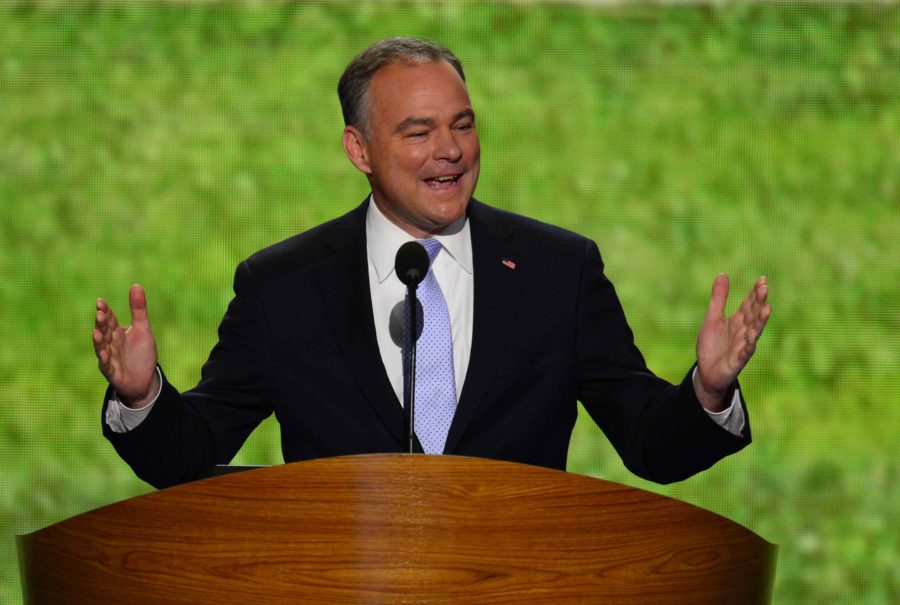Column: We need candidates who will offer real change to African-Americans
Former Virginia Gov. Tim Kaine speaks at 2012 Democratic National Convention at the Time Warner Cable Arena in Charlotte, North Carolina, Tuesday, Sept. 4, 2012. (Harry E. Walker/MCT)
August 25, 2016
I spoke with Democratic vice presidential nominee Tim Kaine, and the senator from Virginia shared policies to address the unemployment, unequal treatment and inferior education systems that continue to encumber blacks in this country.
But as I listened to Kaine speak of career and technical training as a remedy to the school to prison pipeline, and infrastructure reinvestment as a solution to unemployment, the ghost of Donald Trump lingered ominously in the background.
It was Trump, after all, who had made an assumption-laden pitch to black voters only days before I spoke with Kaine.
Advertisement
“You live in poverty, your schools are no good, you have no jobs, 58 percent of your youth is unemployed,” Trump said. “What the hell do you have to lose?”
I asked Kaine about those comments.
“First thing is that that comment of Trump’s, I mean, I just view it as condescending and borderline ignorant, because, how about voting rights? I mean, Trump is the standard-bearer of a party that is working in state after state after state to take something away from people.

“I’ve been doing a lot of campaigning in North Carolina, and a federal court there recently found that as a matter of fact that the highest state officials had worked with ‘surgical precision’ to try to burden the ability of African Americans to vote,” Kaine said. “So Trump’s claim that he’s gonna somehow be better after he has done things like that, and questioned whether President Obama was born in the United States, is specious.”
Kaine is right. Trump’s claim rings hollow, primarily because his facts are wrong.
According to the U.S. Census Bureau, three out of four blacks lived above the poverty line in 2014, so most of us are not poor. And while black unemployment is traditionally double that of our white counterparts — a fact I believe can be traced to racial bias in hiring and retention — the overall black unemployment rate is below 10 percent.
The vast majority of African Americans are working.
Advertisement*
As for the numbers on unemployed youth, Trump had to do some statistical gymnastics to come up with 58 percent. The Bureau of Labor Statistics puts the number at 25.7 percent.
Still, blacks undoubtedly continue to lag behind whites in an America that erects too many barriers to success, tolerates too many institutionalized inequities, and engages in stubborn denial.
I ticked off a few statistics for Kaine.
Blacks and Hispanics make up the majority of the 2.2 million prisoners in America, though we’re only 30 percent of the population.
Black unemployment is at 9.6 percent though the white unemployment rate is half that.
Forty percent of the unarmed people shot by police are black men, though black men are only 6 percent of the population.
How, I asked, would those numbers change if black people voted for Hillary Clinton?
“The stats that you point out are real,” Kaine said, “and we’ve got to grapple with them. … Let me just jump onto the criminal justice side.
“We do have to do very significant criminal justice reform — prison sentencing reform, especially — to really change the way we deal with nonviolent offenders because of this overincarceration problem. We have to work very diligently on an issue that I worked on a lot when I was mayor (of Richmond, Va.), which is, how do we have in the policing models and the policing strategies in our cities more of a focus on community policing that builds bonds between neighborhoods and police? Because when there are gulfs and distance, it’s dangerous to people, and it’s dangerous to law enforcement, too.”

I agree, and I’m encouraged that Kaine has worked on such policies.
But I couldn’t help thinking, as Kaine ticked off the Democratic talking points on incarceration and educational investment, whether there was something more. Because even as Kaine rightly pointed to the needed investment in mental health and substance abuse treatment as a means to reduce mass incarceration, the elephant remained firmly planted in the room.
Black Americans, despite our advances, continue to live in a country where an appeal to racism and bigotry can win a presidential candidate a sizable portion of the vote.
Until we deal specifically with that problem, we will continue living out the legacy that the Kerner Commission predicted nearly 50 years ago.
We will continue to be two societies, one black, one white — separate and unequal. It’s my hope the next president will change that.
Otherwise, we may indeed find ourselves with nothing to lose.
Solomon Jones is a columnist for the Philadelphia Daily News. Readers may email him at [email protected].
___
(c) 2016 Philadelphia Daily News
Visit the Philadelphia Daily News at www.philly.com
Distributed by Tribune Content Agency, LLC.
Advertisement









